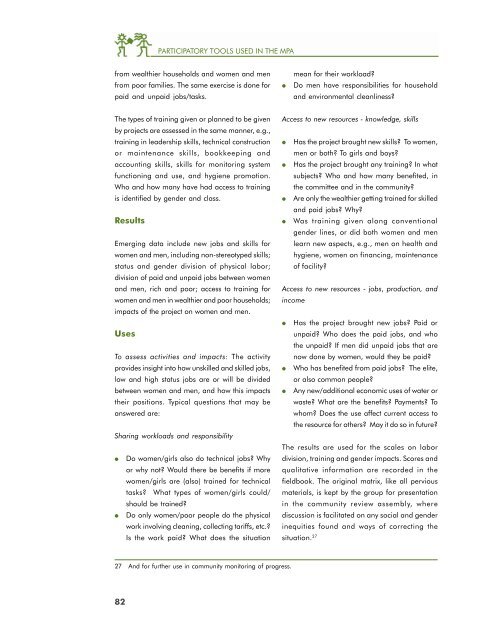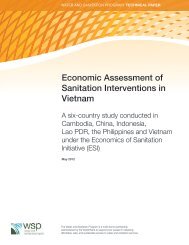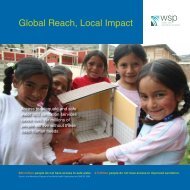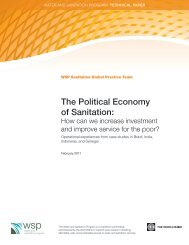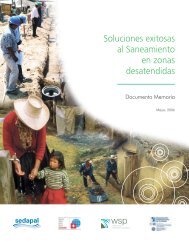Sustainability Planning and Monitoring
Sustainability Planning and Monitoring
Sustainability Planning and Monitoring
- No tags were found...
Create successful ePaper yourself
Turn your PDF publications into a flip-book with our unique Google optimized e-Paper software.
PARTICIPATORY TOOLS USED IN THE MPAfrom wealthier households <strong>and</strong> women <strong>and</strong> menfrom poor families. The same exercise is done forpaid <strong>and</strong> unpaid jobs/tasks.●mean for their workload?Do men have responsibilities for household<strong>and</strong> environmental cleanliness?The types of training given or planned to be givenby projects are assessed in the same manner, e.g.,training in leadership skills, technical constructionor maintenance skills, bookkeeping <strong>and</strong>accounting skills, skills for monitoring systemfunctioning <strong>and</strong> use, <strong>and</strong> hygiene promotion.Who <strong>and</strong> how many have had access to trainingis identified by gender <strong>and</strong> class.ResultsEmerging data include new jobs <strong>and</strong> skills forwomen <strong>and</strong> men, including non-stereotyped skills;status <strong>and</strong> gender division of physical labor;division of paid <strong>and</strong> unpaid jobs between women<strong>and</strong> men, rich <strong>and</strong> poor; access to training forwomen <strong>and</strong> men in wealthier <strong>and</strong> poor households;impacts of the project on women <strong>and</strong> men.UsesTo assess activities <strong>and</strong> impacts: The activityprovides insight into how unskilled <strong>and</strong> skilled jobs,low <strong>and</strong> high status jobs are or will be dividedbetween women <strong>and</strong> men, <strong>and</strong> how this impactstheir positions. Typical questions that may beanswered are:Sharing workloads <strong>and</strong> responsibility●●Do women/girls also do technical jobs? Whyor why not? Would there be benefits if morewomen/girls are (also) trained for technicaltasks? What types of women/girls could/should be trained?Do only women/poor people do the physicalwork involving cleaning, collecting tariffs, etc.?Is the work paid? What does the situationAccess to new resources - knowledge, skills●●●●Has the project brought new skills? To women,men or both? To girls <strong>and</strong> boys?Has the project brought any training? In whatsubjects? Who <strong>and</strong> how many benefited, inthe committee <strong>and</strong> in the community?Are only the wealthier getting trained for skilled<strong>and</strong> paid jobs? Why?Was training given along conventionalgender lines, or did both women <strong>and</strong> menlearn new aspects, e.g., men on health <strong>and</strong>hygiene, women on financing, maintenanceof facility?Access to new resources - jobs, production, <strong>and</strong>income●●●Has the project brought new jobs? Paid orunpaid? Who does the paid jobs, <strong>and</strong> whothe unpaid? If men did unpaid jobs that arenow done by women, would they be paid?Who has benefited from paid jobs? The elite,or also common people?Any new/additional economic uses of water orwaste? What are the benefits? Payments? Towhom? Does the use affect current access tothe resource for others? May it do so in future?The results are used for the scales on labordivision, training <strong>and</strong> gender impacts. Scores <strong>and</strong>qualitative information are recorded in thefieldbook. The original matrix, like all perviousmaterials, is kept by the group for presentationin the community review assembly, wherediscussion is facilitated on any social <strong>and</strong> genderinequities found <strong>and</strong> ways of correcting thesituation. 2727 And for further use in community monitoring of progress.82


